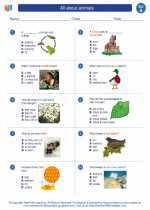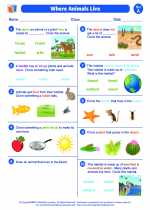Photosynthesis Study Guide
Photosynthesis is the process by which green plants, algae, and some bacteria convert light energy into chemical energy in the form of glucose. This process takes place in the chloroplasts of plant cells and is essential for the survival of most living organisms on Earth. Here's a breakdown of the key concepts related to photosynthesis:
What is Photosynthesis?
Photosynthesis is the process by which green plants, algae, and some bacteria use sunlight to synthesize foods with the help of chlorophyll. The overall chemical reaction for photosynthesis is:
6CO2 + 6H2O + light energy → C6H12O6 + 6O2
Key Components of Photosynthesis
- Chloroplasts: These are the organelles where photosynthesis takes place in plant cells. They contain chlorophyll, the green pigment that captures light energy.
- Light Energy: Sunlight provides the energy needed for the photosynthetic process.
- Carbon Dioxide (CO2): Plants take in carbon dioxide from the atmosphere through small openings in their leaves called stomata.
- Water (H2O): Plants absorb water from the soil through their roots, and it is transported to the leaves for photosynthesis.
- Glucose (C6H12O6): The end product of photosynthesis, which serves as a source of energy for the plant.
- Oxygen (O2): Oxygen is released as a byproduct of photosynthesis and is vital for the survival of aerobic organisms.
Photosynthesis Process
The process of photosynthesis can be broken down into two main stages:
- Light-dependent reactions: These reactions occur in the thylakoid membranes of the chloroplasts and require light energy to split water molecules, releasing oxygen and producing ATP and NADPH.
- Calvin cycle (Light-independent reactions): This stage takes place in the stroma of the chloroplasts and uses the ATP and NADPH produced in the light-dependent reactions to convert carbon dioxide into glucose.
Importance of Photosynthesis
Photosynthesis is crucial for the existence of life on Earth as it is the primary process by which energy from the sun is captured and converted into organic compounds. It also plays a vital role in the oxygen-carbon dioxide balance in the atmosphere, providing oxygen for respiration and removing carbon dioxide from the air.
Understanding the process of photosynthesis is essential for comprehending the interconnectedness of living organisms and their environments.
.◂Science Worksheets and Study Guides First Grade. All about animals

 Worksheet/Answer key
Worksheet/Answer key
 Worksheet/Answer key
Worksheet/Answer key
 Worksheet/Answer key
Worksheet/Answer key
 Worksheet/Answer key
Worksheet/Answer key
 Vocabulary/Answer key
Vocabulary/Answer key
